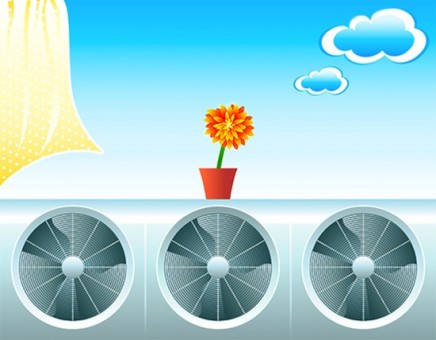Some Cool Learning Before Summer Begins
A MiddleWeb Blog
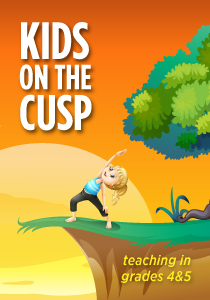 When there are about three weeks left of school, a new summer climate emerges in our classroom. It happens every June, and climate control is essential, as interest levels wane and fantasies of beach life and summer fun float in and out of daily thoughts.
When there are about three weeks left of school, a new summer climate emerges in our classroom. It happens every June, and climate control is essential, as interest levels wane and fantasies of beach life and summer fun float in and out of daily thoughts.
Teaching in a classroom that doesn’t have air conditioning can be a challenge this time of year. The last few weeks of school are hot…very hot.
The heavy air invites lethargy. It’s easier to goof off with the promise of summer just outside the window…harder for me to stay focused on teaching and to keep the level of enthusiasm up.
It’s hard on the kids too…
We’ve gotten flexible
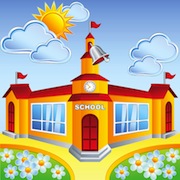
The other day, Steve and Tony stopped into the room. They are two of the district electricians. I see them at random intervals throughout the school year. They’re just nice guys doing their job, and we often share a laugh and a smile.
I stopped our lesson.
“Hi Steve! Hi Anthony!” I bellowed heartily.
“Hi Steve and Anthony!” echoed 23 voices in happy unison. The kids like the interruptions. They welcome the mini-distractions that help break up the learning of the day.
“Is your class going to be in the room all afternoon?” Steve inquired with a slight grin, as he glanced down at the drill in his hand.
Then the light came on (pardon the pun, but I just couldn’t resist). They were here to install the air conditioner that our PTO had donated…the air conditioner I have taught without for so many years. Salvation, at last!
This sudden and welcome surprise was not in the lesson plans. Luckily, monitoring and adjusting are tools that I have learned to use well over the years. If changing the lesson up offered us temperature control during our last few weeks of learning, then change we would!
Steve and Tony needed an hour.
“Okay gang,” I announced. “Change of plans. Grab your Reading Workshop tool boxes, and don’t forget something to write with.”
Reading outdoors
It was a breezy, seventy-something day. The front lawn offered sunny and shady choices to settle into with our books. I chose a sunny patch of grass and watched them find spots that fit their reading preferences. It was really easy to spread out and get lost in a book.
Glancing across the lawn, I took a moment to look at each child. It has been a good year. We’ve had our struggles, but we’ve had many more successes.
Shep, a quiet young lady, was poised with her back against a tree trunk, a look of calm concentration on her face. Peter was lying on his back, arms extended towards the sky, using his book to shade his eyes as he lost himself in his story.
I don’t often get to participate in independent reading during class time. It is, however, a wonderful way to model our love of reading to them (and it sure was nice lying on the grass).
An hour later, we had AC!
Be cool and learn
The new air conditioner makes quite a difference. It’s easier to put aside mixed emotions about the end of the year and continue learning. There are certain mini-lessons and activities that I save for these last weeks, regardless of room temperature. Our sense of summer hasn’t left the air; it’s just cooler in our classroom.
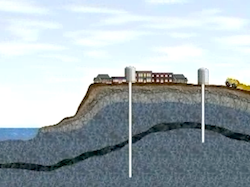
There are four sites that The Center for Science Seekers has identified as possible sources of the contamination. (You can look at the student materials in this PDF.)
The kids get hooked right away. After the introduction plays, they are sent to a secret location behind the American Museum of History called Seekers Central, the covert center for scientific espionage and inquiry.
Aside from being an excellent way to review and discuss some of the big topics we’ve encountered this year, such as properties of water, world oceans, water supply, conservation, preservation, and ecology, the kids get an opportunity to meet in specialist groups, share information, teach newly learned topics to peers, and use scientific concepts (and math formulas) to locate the source of the toxic leak.
Next week, each group will select the site they think is the source of the contamination, use scientific reasoning for why they eliminated the other sites, and provide a plan for creating an alternate source of usable water for the community.
The warm weather also gives us more opportunity to take advantage of the Walking Classroom, a program I began using with my students three years ago. TWC is a great way to get outside, get our bodies moving, and also keep our brains awake and alert.
We are finishing the year with a baseball theme. Our final TWC podcasts will teach us about narrative poetry with “Casey at the Bat,” the Negro Baseball League, the history of “Take Me Out to the Ball Game,” and finally, Abbott and Costello’s “Who’s on First.”

Our final, final drafts in writing continue to keep my writers on task while I meet with each one of the kids to assess their levels of reading comprehension. We are fortunate enough to have access to a laptop cart, and word-processing is always something the kids enjoy. Our stories are typed. These last weeks will allow us to change fonts, play around with the thesaurus feature, and peer-edit with panache.
Not just yet
I imagine I am not the only one who has dual feelings about the year coming to a close. It’s hard to say good-bye. It’s hard to think about starting over again in September with a new crew, whether you are a teacher or a kid.
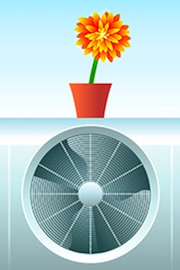
There are still a few lessons to be learned…for us, summer isn’t here just yet. Thank you, Steve and Anthony, for making the classroom climate cooperate.

